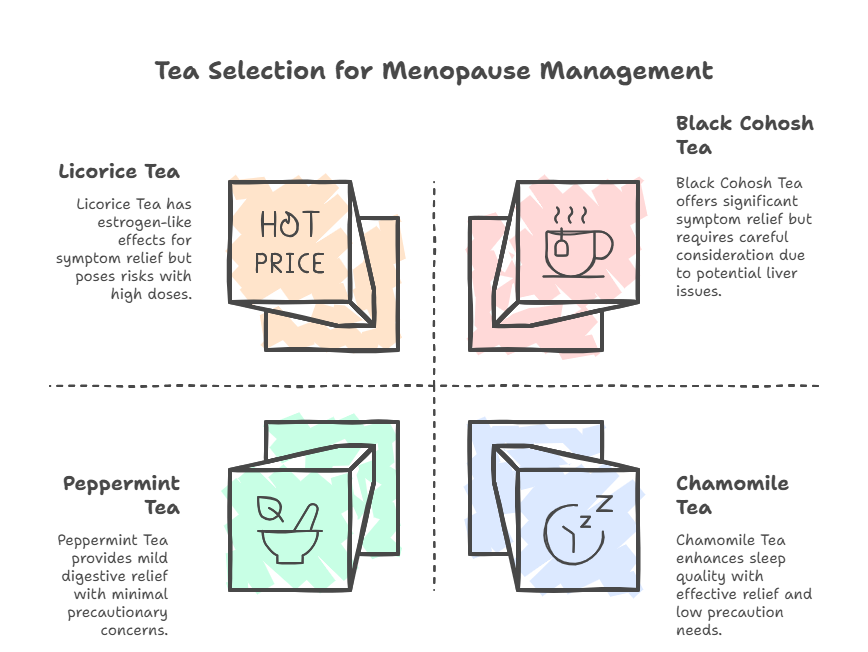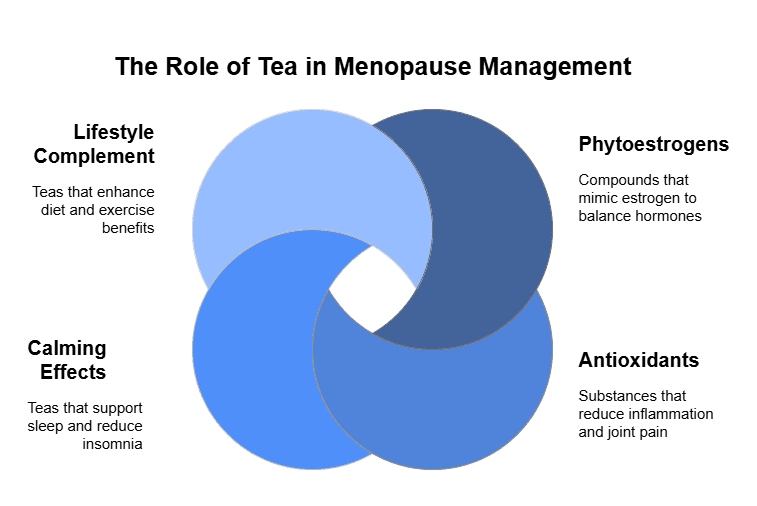Introduction to Menopause and Tea
Menopause marks the end of menstrual cycles, usually in a woman’s 40s or 50s, and often brings symptoms like hot flashes, night sweats, mood swings, and trouble sleeping. While it’s a natural phase, it can feel overwhelming. Tea, with its soothing nature, might offer a gentle way to ease these symptoms. This article explores the best teas for menopause, backed by science, and how they fit into managing this life stage.
Best Teas for Menopause Symptoms
Here’s a look at eight teas that research suggests could help, along with how to prepare them and any precautions. Remember, these are complementary approaches, not replacements for medical advice.

- Black Cohosh Tea: May reduce hot flashes and vaginal dryness, with some studies showing a 26% reduction in night sweats (Black Cohosh Benefits). Steep 1 teaspoon of dried root in boiling water for 5-10 minutes; avoid if pregnant or with liver issues, as it can cause digestive upset.
- Ginseng Tea: Could improve menopausal symptoms and sexual arousal, with some studies showing benefits on symptom scores (Ginseng for Menopause). Steep 1 teaspoon in hot water for 5 minutes; check for interactions with blood-thinning medications.
- Chamomile Tea: Helps with sleep and anxiety, with research suggesting it improves sleep quality after weeks of use (Chamomile Tea Benefits). Steep 1-2 teaspoons in hot water for 5-10 minutes; generally safe, but watch for allergies.
- Green Tea: Supports bone health and may aid weight management, with a 2009 study linking it to better bone metabolism (Green Tea for Menopause). Steep at 175°F for 1-2 minutes to avoid bitterness; limit due to caffeine, which might worsen hot flashes.
- Licorice Tea: May reduce hot flash duration, with estrogen-like effects noted in some research (Licorice Tea Benefits). Steep 1 teaspoon in hot water for 5 minutes; avoid large doses due to potential glycyrrhizin accumulation, and consult a doctor if on medications.
- Red Clover Tea: Contains phytoestrogens, with a meta-analysis showing reduced hot flashes at doses of 80mg/day (Red Clover Menopause Benefits). Steep 1-2 teaspoons for 10 minutes; avoid if pregnant or with hormone-sensitive conditions.
- Valerian Root Tea: Aids sleep and reduces anxiety, with studies supporting its use for insomnia (Valerian Root Benefits). Steep 1 teaspoon in hot water for 5-10 minutes; can cause drowsiness, so avoid with sedatives.
- Peppermint Tea: Soothes digestive issues, which can be common during menopause, and is generally refreshing (Peppermint Tea Benefits). Steep 1 teaspoon in hot water for 5-10 minutes; safe for most, but check for heartburn if prone.
Comprehensive Analysis of Teas for Menopause Relief
This detailed exploration delves into the best teas for managing menopause symptoms, drawing on scientific research, expert insights, and practical advice. Menopause, a natural transition typically occurring in a woman’s 40s or 50s, brings challenges like hot flashes, night sweats, mood swings, and sleep disturbances. Tea, with its rich history in herbal medicine, offers a potential ally in navigating this phase. This section provides an in-depth look at eight teas, their benefits, preparation methods, and precautions, ensuring a holistic understanding for those seeking natural relief.
Understanding Menopause and Its Impact
Menopause signifies the cessation of menstrual cycles, often lasting from perimenopause (which can span 10 months to 4 years) into postmenopause. Symptoms vary widely, including vasomotor issues like hot flashes and night sweats, psychological changes like mood swings and anxiety, and physical concerns like vaginal dryness and bone density loss. These can significantly affect quality of life, prompting many to seek natural remedies like tea, which may offer phytoestrogens, antioxidants, and calming effects to mitigate discomfort.
The Role of Tea in Menopause Management

Tea, particularly herbal varieties, is increasingly recognized for its potential to ease menopause symptoms. Phytoestrogens in teas like red clover and licorice mimic estrogen, potentially balancing hormonal fluctuations. Antioxidants in green tea and chamomile may reduce inflammation, a trigger for joint pain and mood swings. Additionally, calming teas like valerian root and chamomile can support sleep, crucial during menopause when insomnia is common. While tea isn’t a cure, it complements lifestyle changes like diet and exercise, offering a holistic approach.
Detailed Analysis of Recommended Teas
Below is a table summarizing the key teas, their benefits, preparation methods, and precautions, followed by individual discussions:
| Tea Name | Benefits for Menopause | Preparation Method | Precautions |
| Black Cohosh | May reduce hot flashes, vaginal dryness; 2010 review showed 26% reduction in night sweats (Black Cohosh Benefits) | Steep 1 tsp dried root in boiling water, 5-10 min; or simmer 20g root in 34oz water, reduce by third, drink 1 cup 3x daily | Possible digestive upset, nausea; avoid if pregnant, with liver issues, or on certain meds |
| Ginseng | May improve menopausal symptoms, sexual arousal; 2022 review showed reduced symptoms in 3 studies (Ginseng for Menopause) | Steep 1 tsp in hot water, 5 min | Interactions with blood-thinning, heart, diabetes meds; may cause jitteriness |
| Chamomile | Aids sleep, reduces anxiety; 2019 review noted improved sleep quality after 2-4 weeks (Chamomile Tea Benefits) | Steep 1-2 tsp in hot water, 5-10 min | Generally safe; check for allergies, rare sedative effects |
| Green Tea | Supports bone health, weight management; 2009 study linked to better bone metabolism (Green Tea for Menopause) | Steep at 175°F, 1-2 min, to avoid bitterness | Contains caffeine; limit if sensitive, may worsen hot flashes |
| Licorice | May reduce hot flash duration, has estrogen-like effects (Licorice Tea Benefits) | Steep 1 tsp in hot water, 5 min | Avoid large doses; can cause glycyrrhizin accumulation, interact with meds |
| Red Clover | Contains phytoestrogens, meta-analysis showed reduced hot flashes at 80mg/day (Red Clover Menopause Benefits) | Steep 1-2 tsp, 10 min | Avoid if pregnant, breastfeeding, or with hormone-sensitive conditions |
| Valerian Root | Helps with sleep, anxiety; studies support use for insomnia (Valerian Root Benefits) | Steep 1 tsp in hot water, 5-10 min | Can cause drowsiness; avoid with sedatives, alcohol |
| Peppermint | Soothes digestive issues, refreshing; noted for general comfort during menopause (Peppermint Tea Benefits) | Steep 1 tsp in hot water, 5-10 min | Generally safe; watch for heartburn if prone |
Black Cohosh Tea
Black cohosh, known scientifically as Actaea racemosa, is a North American herb traditionally used for menopausal symptoms. Research, including a 2010 review, suggests a 26% reduction in night sweats and hot flashes, potentially due to its phytoestrogen-like effects (Black Cohosh Benefits). However, a 2023 review found mixed results, with benefits for hot flashes but not anxiety (Black Cohosh Usefulness). Prepare by steeping 1 teaspoon of dried root in boiling water for 5-10 minutes, or simmer 20g of root in 34oz water, reducing by a third, and drink one cup three times daily. Precautions include possible digestive upset and liver concerns; avoid if pregnant or with liver issues.
Ginseng Tea
Ginseng, particularly Korean red ginseng (KRG), has been studied for menopause, with a 2022 systematic review of 15 RCTs showing significant reductions in hot flashes and menopausal symptoms (Ginseng for Menopause). Another study noted improvements in sexual arousal and quality of life, though some trials showed no effect on hot flash frequency. Steep 1 teaspoon in hot water for 5 minutes. Be cautious of interactions with blood-thinning, heart, or diabetes medications, and potential side effects like jitteriness.
Chamomile Tea
Chamomile, a calming herb, is prized for sleep and anxiety relief, common menopause issues. A 2019 review found improved sleep quality after 2-4 weeks, and a study combining chamomile with saffron and fennel showed benefits for physical and psychological symptoms (Chamomile Tea Benefits). Steep 1-2 teaspoons in hot water for 5-10 minutes. It’s generally safe, but check for allergies, and it may have mild sedative effects.
Green Tea
Green tea, rich in antioxidants like catechins, supports bone health and may aid weight management during menopause. A 2009 study found it strengthens bone metabolism, reducing fracture risk (Green Tea for Menopause), and another noted benefits for inflammation and stress (Green Tea Benefits). Steep at 175°F for 1-2 minutes to avoid bitterness. Limit due to caffeine, which might exacerbate hot flashes for some.
Licorice Tea
Licorice tea, with its estrogen-like effects, may reduce hot flash duration, as noted in some research (Licorice Tea Benefits). It also supports respiratory health and stress reduction. Steep 1 teaspoon in hot water for 5 minutes. Avoid large doses due to glycyrrhizin accumulation, which can affect blood pressure, and consult a doctor if on medications.
Red Clover Tea
Red clover, rich in isoflavones, is a phytoestrogen source, with a meta-analysis showing reduced hot flashes at 80mg/day, especially in formulations with higher biochanin A (Red Clover Menopause Benefits). Another study found benefits for quality of life in postmenopausal women (Red Clover Effects). Steep 1-2 teaspoons for 10 minutes. Avoid if pregnant, breastfeeding, or with hormone-sensitive conditions like breast cancer.
Valerian Root Tea
Valerian root is known for sleep and anxiety relief, with studies supporting its use for insomnia, beneficial during menopause (Valerian Root Benefits). Steep 1 teaspoon in hot water for 5-10 minutes. It can cause drowsiness, so avoid combining with sedatives or alcohol, and consult a doctor for long-term use due to rare liver concerns.
Peppermint Tea
Peppermint tea soothes digestive issues, which can worsen during menopause, and offers a refreshing option (Peppermint Tea Benefits). Steep 1 teaspoon in hot water for 5-10 minutes. It’s generally safe, but watch for heartburn if prone, and it’s not a primary treatment but a supportive one.
Blended Teas for Comprehensive Relief
Blended teas, like Lady Bliss Tea from Herbs & Kettles, combine herbs like ashoka, chamomile, and valerian for broad symptom relief (Best Teas for Menopause). These blends target multiple symptoms, such as hot flashes, sleep issues, and digestion, offering a convenient option. Check ingredients for individual sensitivities and consult a healthcare provider.
Choosing the Right Tea for Your Symptoms
Match teas to your needs: chamomile or valerian for sleep, black cohosh or red clover for hot flashes, green tea for bone health. Consider blends for multiple symptoms. Always consult a doctor, especially if on medications, as teas can interact, and individual responses vary. For example, if hot flashes are your main issue, red clover at 80mg/day might help, but check for hormone sensitivity.
Lifestyle Tips and Holistic Approach
Tea fits into a broader menopause strategy. Maintain a balanced diet rich in calcium and vitamin D for bone health, exercise regularly to manage weight, and practice stress reduction like meditation. Tea complements these, offering a soothing ritual. For instance, sipping chamomile before bed can enhance sleep hygiene, while green tea’s antioxidants support overall wellness.
Something to consider
Menopause brings challenges, but teas like black cohosh, ginseng, chamomile, green tea, licorice, red clover, valerian root, and peppermint offer potential relief, backed by varying levels of evidence. Prepare them simply by steeping, but always consider precautions and consult healthcare providers. Embrace tea as part of a holistic approach, and find what works for you in this natural transition.
Key Citations
- Black Cohosh Benefits, Dosage, Side Effects, and More
- Ginseng for managing menopause symptoms: a systematic review
- 5 benefits of chamomile tea
- 10 Best Teas for Menopause Hot Flashes and Other Symptoms
- 3 ways tea makes menopause easier
- What are the Health Benefits of Red Clover and Can it Help with Symptoms of the Menopause
- Best Teas for Menopause: Alleviate Menopause & Perimenopause Symptoms Naturally
- The best herbal teas to relieve peri-menopause symptoms
- 10 Best Teas for Menopause & Perimenopause Relief
- 14 Teas That Are Good For Menopause
- Menopause Tea by HotTea Mama
- Premium Teas For Perimenopause And Menopause
- The use of black cohosh to treat symptoms of menopause
- Black cohosh for menopause: Uses and side effects
- Black Cohosh: Usefulness and Safety
- Using ginseng for menopausal women’s health care: A systematic review
- The effect of herbal tea capsule on menopause hot flashes
- Evaluation of Clinical Meaningfulness of Red Clover Extract to Relieve Hot Flushes
- The effects of red clover on quality of life in post-menopausal women
- Black Cohosh Tea – Relief in a Cup of Tea
- Organic Black Cohosh Root Tea | Buddha Teas | Free Shipping

